Best Water Heater
When performing a bathroom, kitchen, or full interior remodel, we frequently install a replacement water heater. There is always the question of replacing the existing tank water heater with a tankless water heater. The next question is usually “what is the best water heater?” To answer the best water heater question, let’s look at both and the pros and cons.
Types of Hot Water Heaters
- Tank water heater – These can be either gas or electric. Residential units typically come in sizes ranging from 40 to 75 gallons. The two most common sizes are 40 and 50 gallons.
- Tankless water heater – These too can be either gas or electric. Residential units typically come in sizes defined in BTU’s, water flow rate, and number of fixtures. The more water fixtures you have, the higher BTU and flow rate required. The typical size for South Orange County homes with 3 to 5 fixtures is 10,300 BTU (Minimum) / 199,000 BTU (Maximum) with a water flow rate of about 9.8 GPM (Gallons Per Minute).
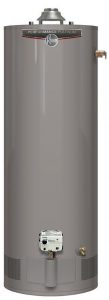 | 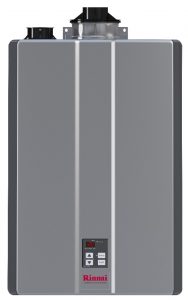 | 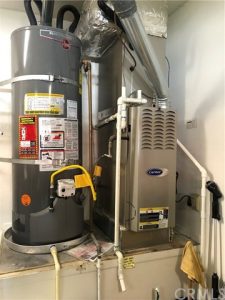 | 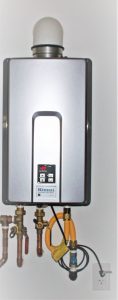 |
| Tank Water Heater | Tankless Water Heater | Tank Water Heater Installed In Garage | Tankless Water Heater Installed In Garage |
Is a Gas or Electric Better?
Heating water is the second-largest expense in our homes, according to the Department of Energy. This accounts for for 14% to 18% of our utility bills. That makes picking the right water heater an important decision. This is important not only for your comfort, but for keeping energy costs under control.
A gas tank water heater can heat the water in a 50-gallon tank in about one-hour vs several hours for an electric tank water heater. The recovery rate (i.e. time taken to reheat a tank of water after use) for a gas water heater is much faster than that of an electric water heater. For families of four or more people, a gas unit is usually a better choice over electric. Why? An electric heater is likely to have trouble keeping up with the hot water demands of a larger family.
An electric tank water heater costs about $1.20 per day, about $36.50 per month, or $438 per year. A gas tank water heater costs about $.62 per day, $18.70 per month and $224 per year. Therefore, a gas water heater will cost about $214 or 49% less than an electric water heater each year. Over 13 years, the cost savings over electric is about $2,782.
Gas tankless water heaters heat water as you use it. Therefore, they can be up to 35-50 percent more energy efficient than a traditional tank-type unit. This means an additional annual energy savings of about $78-$107 or another $1,019-$1,391 over 13 years compared to a gas tank type heater – that’s a savings of over $3,800-$4,173 over an electric tank water heater. Installing a condensing tankless unit (uses heat from the exhaust gases to preheat cold water coming into the tank) can achieve an additional 20% increase in efficiency for a total of 55% greater efficiency over a tank water heater.
What’s the Difference between a Tank and Tankless?
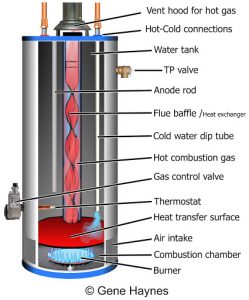 Tank Water Heater – These units are hot water storage reservoirs. To keep the water hot, it must be constantly heated to the desired temperature. This costs money. Moreover, as you use the hot water, it becomes increasingly cold. A fully heated, 50-gallon tank will deliver roughly 33 gallons of hot water at any given time. The average shower uses 2 gallons of water per minute. Therefore, that same 50-gallon tank is good for a little less than 17 minutes of hot water – provided no one else is using hot water!
Tank Water Heater – These units are hot water storage reservoirs. To keep the water hot, it must be constantly heated to the desired temperature. This costs money. Moreover, as you use the hot water, it becomes increasingly cold. A fully heated, 50-gallon tank will deliver roughly 33 gallons of hot water at any given time. The average shower uses 2 gallons of water per minute. Therefore, that same 50-gallon tank is good for a little less than 17 minutes of hot water – provided no one else is using hot water!
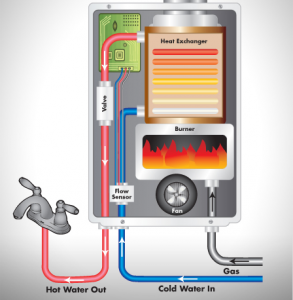 Tankless Water Heater – These units provide an endless supply of hot water for a lot less money than a traditional tank water heater. Unlike tank type water heaters, a tankless unit costs nothing when its not being used. These also take up much less space than a traditional tank water heater, freeing up room for storage.
Tankless Water Heater – These units provide an endless supply of hot water for a lot less money than a traditional tank water heater. Unlike tank type water heaters, a tankless unit costs nothing when its not being used. These also take up much less space than a traditional tank water heater, freeing up room for storage.
What About the Warranty?
Most folks don’t think about their water heaters until they come home from work and the garage is flooded or they wake up in the morning to a cold shower. Most of the time it’s a flooded garage or house (or both!).
The time to replace a water heater is before disaster strikes. When you’re out of hot water and you call the plumber, they got you! They know you don’t have time to shop around or wait days or weeks to get 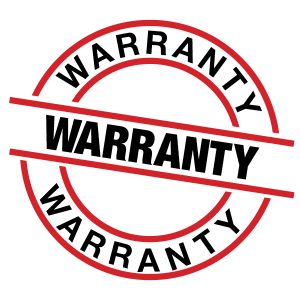 your hot water back. It’s a fact that most people hire the first plumber they call. They get a great price over the phone or internet to replace just the water heater itself. The plumber always arrives with the new unit, unloads it, and you get excited – you’re ready to get the hot water back on! But, after the plumber inspects your old water heater, the price skyrockets after he tells you about all this other stuff that must be replaced. You are stuck – so you say “yes” and spend a small fortune! If disaster strikes on a weekend, after 5:00 p.m., or on a holiday, you pay through the teeth (ouch!).
your hot water back. It’s a fact that most people hire the first plumber they call. They get a great price over the phone or internet to replace just the water heater itself. The plumber always arrives with the new unit, unloads it, and you get excited – you’re ready to get the hot water back on! But, after the plumber inspects your old water heater, the price skyrockets after he tells you about all this other stuff that must be replaced. You are stuck – so you say “yes” and spend a small fortune! If disaster strikes on a weekend, after 5:00 p.m., or on a holiday, you pay through the teeth (ouch!).
Most tankless water heaters have a life expectancy of more than 20 years. They also have easily replaceable parts that extend their life by many more years. In contrast, tank water heaters self-destruct, possibly flooding your garage or home after 10–15 years causing considerably damage.
My best advice is to replace your water heater when the warranty has expired! Don’t wait for the impending disaster. It always seems to happen at the worst possible time.
Look for These Warranties When Selecting a Water Heater
Tank Water Heater – The better units have a 10 or 12-year warranty. Most of the units installed by plumbers, especially the larger companies, use a 5- or 6-year warranty water heater. Never install anything less than a 10-year warranty unit. I believe the best tank hot water heaters are made by Rheem and Bradford White. See Rheem Tank Water Heaters and Bradfordwhite.com.
Tankless Water Heater – The better units have a 12 to 15-year warranty. The typical warranty is 10 to 12 years. The most important part of the warranty is on the heat exchanger. This radiator looking item is where the water is heated and transported to the hot water pipes. I believe the best tankless hot water heaters are made by Rinnai (my top choice . . . see Rinnai Tankless Water Heaters) and Navien (see Navien Tankless Water Heaters).
Always Install a ScaleBlaster When Installing a New Water Heater
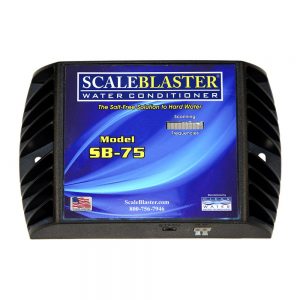 When installing a new water heater (tank or tankless), always install a water conditioner. My top pick is the ScaleBlaster. Mineral scale (hard water) buildup at the bottom of the tank in tank water heaters will shorten a tank’s lifespan. This makes them increasingly more expensive to operate over time. I have personally removed tank water heaters where the tank was more than 1/3 full of sediment and mineral deposits. That’s 17 gallons of solid crud filling up the tank!
When installing a new water heater (tank or tankless), always install a water conditioner. My top pick is the ScaleBlaster. Mineral scale (hard water) buildup at the bottom of the tank in tank water heaters will shorten a tank’s lifespan. This makes them increasingly more expensive to operate over time. I have personally removed tank water heaters where the tank was more than 1/3 full of sediment and mineral deposits. That’s 17 gallons of solid crud filling up the tank!
For tankless units, mineral deposits will foul the heat exchanger and shorten its life by years. See ScaleBlaster Water Conditioner and ScaleBlaster Home Water Filter System for more information on how this device can save you money and provide overall improvement of drinking water.
Which One Is Better – A Tank or Tankless Water Heater?
Tankless Water Heaters:
- Tankless water heaters heat cold water on demand only as you need it. That makes them more efficient than standard tank models, but they’re more expensive to buy and install.
- Save money over time.
 Last longer than tank storage water heaters.
Last longer than tank storage water heaters.- Tankless water heaters can typically last 20 to 30 years when used with a water conditioner (like the ScaleBlaster), double the forecasted 10-13-year useful life of a storage tank water heater. Be aware that “hard water” areas, may reduce the useful life of both types of water heaters (always install a water conditioner like the ScaleBlaster for the longest and best results when you install a new water heater).
- Endless supply of hot water. You’ll have hot water whenever you need it.
- You won’t have to wait 15 to 25 seconds for your water to become hot, as tankless water heaters deliver two to three gallons of hot water per minute. Many storage tank water heaters take longer to heat water, because of the larger volume of water they must heat, than most tankless types.
- Consume a lot less space. Tankless (on-demand) water heaters are small and may be installed in “tight quarters.” They can even be installed on outside walls and inside the wall cavity for a flush, fully integrated and seamless look.
Tank Water Heaters:
- Tank water heaters can’t always handle hot water needs in high-demand homes.
- Storage tank water heaters have lower initial cost by a significant margin. However, they have much higher operating costs. Since storage tank water heaters heat, then reheat water to a pre-set temperature, irrespective of what your hot water needs happen to be, they increase
 your utility bills. During the cooler winter months, these water heaters will work harder, driving your gas or electric bills even higher during the cold winter.
your utility bills. During the cooler winter months, these water heaters will work harder, driving your gas or electric bills even higher during the cold winter. - Tank water heaters only have a forecasted 10-13-year useful life while tankless water heaters have double the useful life (can typically last 20 to 30 years when used with a water conditioner). Be aware that “hard water” areas, may reduce the useful life of both types of water heaters (always install a water conditioner, such as the ScaleBlaster, for the longest and best results when you install a new water heater).
- You will need to buy and install a tank unit almost twice as often as a tankless heater. This increases even further the cost to own, operate, and replace a tank versus a tankless.
- Occupy more space because of their size. Over the years, tank water heaters have gotten larger in both height and circumference (mostly in circumference) due to more insulation being added to comply with California energy savings regulations. This can require costly space adjustments when replacing a tank unit to accommodate the larger size.
- Limited hot water. For a standard 50-gallon tank, after less than 17 minutes the water will start going cold (remember, only 33 of the 50 gallons are hot best case – this continues decreasing with age as the tank fills with sediment and hard water deposits). It takes about 1 hour for a newer 50-gallon tank water heater to become hot after a typical shower – this increases with age.
Do I Need Permits for a Water Heater?
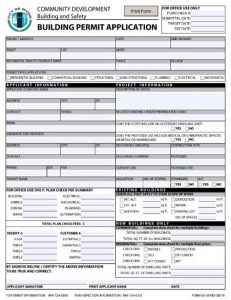 Both tank and tankless units require a building permit.
Both tank and tankless units require a building permit.
I’ve seen much damage to homes over the years by installers who did not get a permit and cut corners on the install. Please don’t make this mistake. Insist on a permit. Don’t let the installer tell you it’s your job – it’s the installers job to get the permit, arrange for the inspection, and be physically present for the inspection. If something goes wrong and there was no permit, you’re on your own – it’s not worth it – get a permit! Make sure it’s written into the contract and there is a minimum of a 10% withhold of the original balance until you receive a copy of the permit card illustrating the Building Officials signature approving all of the work that was performed.
What’s the Cost?
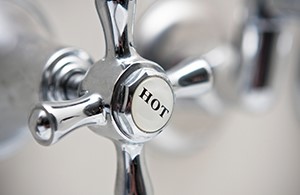 If you want or need an endless supply of hot water (recommended if your home has 3 or more showers or a family of 5 or more) then a tankless water heater is for you. A good quality, long lasting tankless heater will cost around $2,500 to $3,500 vs. about $1,100 for a good quality 12-year lasting 50-gallon tank unit (a lessor quality 6-year unit runs about $700).
If you want or need an endless supply of hot water (recommended if your home has 3 or more showers or a family of 5 or more) then a tankless water heater is for you. A good quality, long lasting tankless heater will cost around $2,500 to $3,500 vs. about $1,100 for a good quality 12-year lasting 50-gallon tank unit (a lessor quality 6-year unit runs about $700).
The cost to install a tankless unit in a garage varies significantly. The cost depends if the unit can be installed where the original tank was installed or must be relocated to another suitable location in the garage. A tankless heater can also be installed outside in a recessed cabinet inside the existing wall cavity. This is a great seamless way to integrate into the house for a very clean and convenient installation.
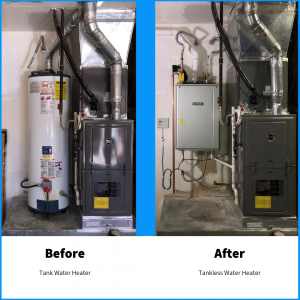 A tankless installation varies from about $3,400 to $8,300 depending on location (inside garage or outside) and adjustments to utilities (gas, waters, and electric).
A tankless installation varies from about $3,400 to $8,300 depending on location (inside garage or outside) and adjustments to utilities (gas, waters, and electric).
A tank heater installation can vary significantly based on 3 factors:
- Is the current tank water heater inside the house?
- Will the space accommodate a modern day, traditional tank water heater?
- Is the current platform that the tank water heater is resting on at the required minimum code height (18” from the floor)? Is it in good structural condition (free of rot, insect damage, not sagging? Does the platform comply with current fire code regulations and wide enough for the new unit)? Will the HVAC
 unit need to be removed and reinstalled to make necessary repairs/rebuild the platform?
unit need to be removed and reinstalled to make necessary repairs/rebuild the platform?
Good guidance when considering the installation of a tank water heater is about $1,800 to $8,500. This can easily exceed the cost to install a new tankless water heater depending on the amount of work involved.
Bottom Line
If your bank account can manage the higher initial cost of a tankless, you’ll save more money over time by choosing tankless. But, if you are on a fixed modest income, a storage tank unit might make more sense for you. Discuss the two types of units with DAD’s Construction to weigh your options.
Always Hire a Reliable and Dependable Contractor to Remodel your Home
 Always work with a trustworthy contractor like DAD’s Construction. We are experts in bathroom, kitchen, and interior remodeling. We remodel and manage projects in an efficient manner. DAD’s Construction will do everything to minimize the possibility of change orders. Our team will make sure we have all the necessary information to prepare a proposal that meets your requirements. Rest assured that we will provide you with a detailed, by line-item contract. We will make sure that the contents of this agreement are properly and clearly communicated to you. If you have questions or need updates regarding your project, we will always answer your inquiries.
Always work with a trustworthy contractor like DAD’s Construction. We are experts in bathroom, kitchen, and interior remodeling. We remodel and manage projects in an efficient manner. DAD’s Construction will do everything to minimize the possibility of change orders. Our team will make sure we have all the necessary information to prepare a proposal that meets your requirements. Rest assured that we will provide you with a detailed, by line-item contract. We will make sure that the contents of this agreement are properly and clearly communicated to you. If you have questions or need updates regarding your project, we will always answer your inquiries.
How Can I Receive More Information?
If you would like more information on enjoying the best water heater, bathroom, kitchen, and interior remodeling experience in Orange County, call Dan at (949) 380-0177 or at dan@dadsconstruction.com for a free in home consultation. DAD’s serves all of South Orange County California. This includes Lake Forest, Mission Viejo, Foothill Ranch, Portola Hills, Ladera Ranch, Irvine, San Clemente, Dana Point, San Juan Capistrano, Rancho Santa Margarita, Coto de Caza, Dove Canyon, Laguna Niguel, Laguna Hills, Newport Beach, and Aliso Viejo.
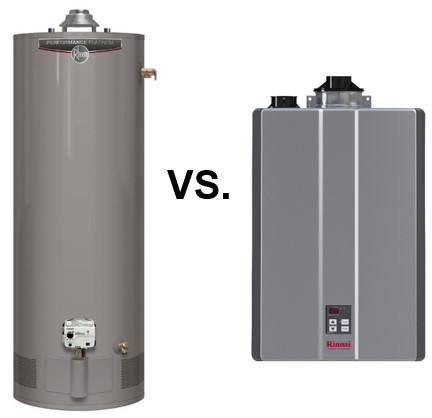
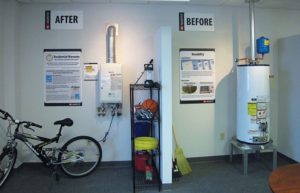 unit need to be removed and reinstalled to make necessary repairs/rebuild the platform?
unit need to be removed and reinstalled to make necessary repairs/rebuild the platform?